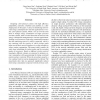Free Online Productivity Tools
i2Speak
i2Symbol
i2OCR
iTex2Img
iWeb2Print
iWeb2Shot
i2Type
iPdf2Split
iPdf2Merge
i2Bopomofo
i2Arabic
i2Style
i2Image
i2PDF
iLatex2Rtf
Sci2ools
121
click to vote
ICDCSW
2009
IEEE
2009
IEEE
Joint Sleep Scheduling and Mode Assignment in Wireless Cyber-Physical Systems
Designing cyber-physical systems with high efficiency, adaptability, autonomy, reliability and usability is a challenging task. In this paper, we focus on minimizing networkwide energy consumption for real-time applications in wireless cyber-physical systems. While a lot of work has been done to manage energy consumption on single processor real-time systems, little work has been done in network-wide energy consumption management for real-time applications. Existing work on network-wide energy minimization assumes that the underlying network is always connected, which is not consistent with the practice in which wireless nodes often turn off their network interfaces in a sleep schedule to reduce energy consumption. This paper jointly consider the radio sleep scheduling of wireless nodes and the execution modes of processors. Based on different wireless network topologies, different schemes are proposed to minimize energy consumption while guaranteeing the timing constraint and preced...
Distributed And Parallel Computing | Energy Consumption | ICDCSW 2009 | Network-wide Energy | Network-wide Energy Consumption |
| Added | 23 May 2010 |
| Updated | 23 May 2010 |
| Type | Conference |
| Year | 2009 |
| Where | ICDCSW |
| Authors | Chun Jason Xue, Guoliang Xing, Zhaohui Yuan, Zili Shao, Edwin Hsing-Mean Sha |
Comments (0)

